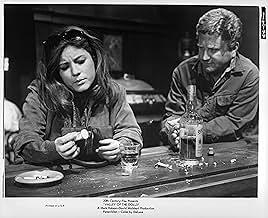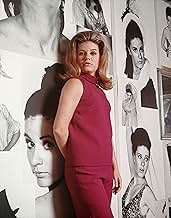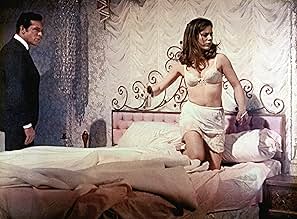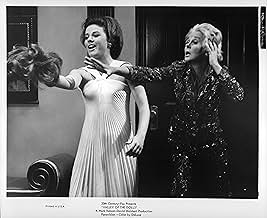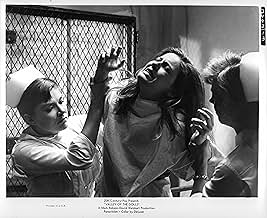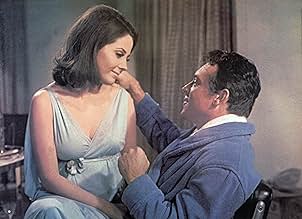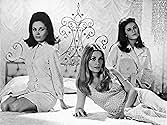ÉVALUATION IMDb
6,0/10
10 k
MA NOTE
Version cinématographique du roman à succès de Jacqueline Susann relatant l'ascension et la chute de trois jeunes femmes dans le monde du spectacle.Version cinématographique du roman à succès de Jacqueline Susann relatant l'ascension et la chute de trois jeunes femmes dans le monde du spectacle.Version cinématographique du roman à succès de Jacqueline Susann relatant l'ascension et la chute de trois jeunes femmes dans le monde du spectacle.
- Director
- Writers
- Stars
- Nommé pour 1 oscar
- 6 nominations au total
Alexander Davion
- Ted Casablanca
- (as Alex Davion)
Sherry Alberoni
- Neely O'Hara
- (voice)
- (uncredited)
Avis en vedette
Viewers who like this film like it mostly because it is such a campy mess. Its main entertainment value lies in the unintended humor that results from cinematic incompetence. The main problem is the screen story.
For one thing, the character arc of Neely O'Hara (Patty Duke) is totally not credible. She's a singer who can't sing. Yet, she inexplicably goes from rags to riches on her singing ability alone. In the process, her personality morphs from sweet young thing to jaded and embittered has-been who barks and scowls at everything and everyone. Pills or no pills, her transformation does not ring true.
In addition, the film's poor plotting renders a story that is at times muddled. The plot darts and flits from one girl to the next; it spurts and sputters in a disconnected sort of way, without viable transitions. And some scenes are included evidently just to convey story exposition. A big part of the on screen time for the Jennifer character (Sharon Tate), for example, consists of three separate, and awkward, phone conversations with her mother. Other methods of explaining detail and advancing the plot would have worked better.
And the film's dialogue is campy, simply because it contains almost no subtext. It's so in-your-face, so lacking in subtlety, that some of it just reeks of junior high school theatrics.
Aside from the screen story, the overall acting is not very good. Patty Duke, in particular, is just downright awful. She shouts, she screams, she exaggerates her facial expressions in ways that are totally out of sync with the dialogue and the plot.
And the film's musical numbers are something else, especially when Susan Hayward attempts to lip sync a ghastly song called "I'll Plant My Own Tree", surrounded on stage by brightly colored fake leaves that whirl around her. The sequence is made even more ludicrous because the audience cheers wildly at the awful performance.
I guess I can't really fault the visuals, since bright colors were so trendy in the 1960s. Still, the visuals do make the film look dated. Those garish costumes and hairdos, that garish makeup, and that garish decor provide just one more reason to sneer at the film.
The only thing worthwhile here is the appearance of lovely Sharon Tate. And the film's sad theme song is professionally done. Otherwise, apart from its unintended humor, "Valley Of The Dolls" is suitable mainly as a lesson for aspiring filmmakers. In a book on film-making, this film could head the chapter: "Don't Let This Happen To You".
For one thing, the character arc of Neely O'Hara (Patty Duke) is totally not credible. She's a singer who can't sing. Yet, she inexplicably goes from rags to riches on her singing ability alone. In the process, her personality morphs from sweet young thing to jaded and embittered has-been who barks and scowls at everything and everyone. Pills or no pills, her transformation does not ring true.
In addition, the film's poor plotting renders a story that is at times muddled. The plot darts and flits from one girl to the next; it spurts and sputters in a disconnected sort of way, without viable transitions. And some scenes are included evidently just to convey story exposition. A big part of the on screen time for the Jennifer character (Sharon Tate), for example, consists of three separate, and awkward, phone conversations with her mother. Other methods of explaining detail and advancing the plot would have worked better.
And the film's dialogue is campy, simply because it contains almost no subtext. It's so in-your-face, so lacking in subtlety, that some of it just reeks of junior high school theatrics.
Aside from the screen story, the overall acting is not very good. Patty Duke, in particular, is just downright awful. She shouts, she screams, she exaggerates her facial expressions in ways that are totally out of sync with the dialogue and the plot.
And the film's musical numbers are something else, especially when Susan Hayward attempts to lip sync a ghastly song called "I'll Plant My Own Tree", surrounded on stage by brightly colored fake leaves that whirl around her. The sequence is made even more ludicrous because the audience cheers wildly at the awful performance.
I guess I can't really fault the visuals, since bright colors were so trendy in the 1960s. Still, the visuals do make the film look dated. Those garish costumes and hairdos, that garish makeup, and that garish decor provide just one more reason to sneer at the film.
The only thing worthwhile here is the appearance of lovely Sharon Tate. And the film's sad theme song is professionally done. Otherwise, apart from its unintended humor, "Valley Of The Dolls" is suitable mainly as a lesson for aspiring filmmakers. In a book on film-making, this film could head the chapter: "Don't Let This Happen To You".
One of the great landmarks in the history of American cinema. This is one of those movies that tells it like it is, takes it on the chin, and really shows some SPARKLE. Oh yeah, the wigs and gowns are fab, too, especially that sequined poison-green trapeze minidress Patty Duke is too trashed to get into towards the end.
There is a kind of sublime awfulness about the performances that elevates every sentence in the screenplay to some scriptural stratum of indelible elegance. Lines like "Gee, honey, that ole witch oughta be boiled in oil," "You're not the BREADWINNAH either," and "SPARKLE, Neely, SPARKLE" ring with poetic resonance in one's mind long after viewing the film. Especially when you find yourself compulsively watching it over and over and over again...
The montage sequences are unbelievably powerful. Forget Medium Cool, you haven't experienced the true tacky splendor of the Sixties till you've seen Barbara Parkins' Gillian Girl Commercial. Get the soundtrack and use the jingle composed by master artiste Andre Previn on your answering machine. Why, all your friends will be ringing the phone off the hook just to have a listen.
As Superstar Helen Lawson, Susan Hayward is head and shoulderpads above the rest of the cast, especially when she's attempting to lipsynch her way through "I'll plant my own tree" while dodging the giant translucent fake Calder mobile (probably built by Monsanto) that's slowly revolving around her. The symbolic-castration wig-in-the-loo sequence has to be seen to be believed. "I'll go out the way I came in" admirably sums up the sentiments of everyone connected with this movie after it was released. See Patty Duke's autobiography for some anecdotes about the filming.
This movie pretty much destroyed Director Mark Robson's career, but it made pots and pots of money for the studio, and was still playing drive in theatres around the country years after its release. And curiously enough, many women I have known now in their fifties and sixties felt drawn to this film, felt that it spoke to them (if not for them) in a way nothing else up till that time had done.
There is a kind of sublime awfulness about the performances that elevates every sentence in the screenplay to some scriptural stratum of indelible elegance. Lines like "Gee, honey, that ole witch oughta be boiled in oil," "You're not the BREADWINNAH either," and "SPARKLE, Neely, SPARKLE" ring with poetic resonance in one's mind long after viewing the film. Especially when you find yourself compulsively watching it over and over and over again...
The montage sequences are unbelievably powerful. Forget Medium Cool, you haven't experienced the true tacky splendor of the Sixties till you've seen Barbara Parkins' Gillian Girl Commercial. Get the soundtrack and use the jingle composed by master artiste Andre Previn on your answering machine. Why, all your friends will be ringing the phone off the hook just to have a listen.
As Superstar Helen Lawson, Susan Hayward is head and shoulderpads above the rest of the cast, especially when she's attempting to lipsynch her way through "I'll plant my own tree" while dodging the giant translucent fake Calder mobile (probably built by Monsanto) that's slowly revolving around her. The symbolic-castration wig-in-the-loo sequence has to be seen to be believed. "I'll go out the way I came in" admirably sums up the sentiments of everyone connected with this movie after it was released. See Patty Duke's autobiography for some anecdotes about the filming.
This movie pretty much destroyed Director Mark Robson's career, but it made pots and pots of money for the studio, and was still playing drive in theatres around the country years after its release. And curiously enough, many women I have known now in their fifties and sixties felt drawn to this film, felt that it spoke to them (if not for them) in a way nothing else up till that time had done.
This movie truly is badly done and campy. However, there is one good reason to watch it: Sharon Tate. She was truly one of the screen's all time beauties (if you disagree at first, name someone prettier =)
She is not a bad actress either and did her best with the forced, artificial dialog. Overall the movie has virtually no suspense or drama or tension it just chugs along predictably with one badly written scene after another. Then all of sudden Wham! Sharon appears and you stop caring about the worthless "plot" and watch her. She steals all her scenes and makes the other actresses invisible.
All in all its a bittersweet vehicle for an extraordinarily lovely woman who met a very violent and tragic end.
She is not a bad actress either and did her best with the forced, artificial dialog. Overall the movie has virtually no suspense or drama or tension it just chugs along predictably with one badly written scene after another. Then all of sudden Wham! Sharon appears and you stop caring about the worthless "plot" and watch her. She steals all her scenes and makes the other actresses invisible.
All in all its a bittersweet vehicle for an extraordinarily lovely woman who met a very violent and tragic end.
There's nothing I can add to the many hilarious and trenchant comments of other IMDB users--"Valley" will live forever as one of the greatest bad movies ever. But here's something nobody else has picked up on. The scene when Patty/Neely discovers hubby Ted cavorting in the pool with another woman? Well, before Patty/Neely sees them, she hears splashing and giddy, girlish laugh. That splash and laugh are Marilyn Monroe--audio from her famous nude swim scene in "Something's Git To Give," the movie she never finished.
Somebody at 20th Century Fox--MM's home studio--had a perverse sense of humor!
Somebody at 20th Century Fox--MM's home studio--had a perverse sense of humor!
In spite of the harsh user comments regarding this film, it is an entertaining and thought provoking late 1960's film. The criticism of Patty Duke's performance seems to me to be at least somewhat unfair and exaggerated. In my opinion, she does an admirable job with her character and handles the role of a star who is struggling with the pressures of fame. It is really quite uncomfortable to watch this film in the present day, if one already is keenly aware of the horrible fate that is in store for Sharon Tate, at the hands of Charles Manson's drugged-out groupies. Not a great film, but much better than the users here would have you believe.
Le saviez-vous
- AnecdotesDirector Mark Robson had a very combative relationship with all his actresses, particularly singling out Sharon Tate for his harsh treatment. Patty Duke hated working with him, and years later, after his death, still called him "a mean son of a bitch".
- GaffesWhen Neely is tap dancing on the table, shown by her shadow on the wall, the shadow does not reflect a pony tail, but when she jumps down, she has a pony tail.
- Citations
Neely O'Hara: Boobies, boobies, boobies. Nothin' but boobies! Who needs 'em? I did great without 'em.
- ConnexionsEdited into Intimate Portrait: Patty Duke (2001)
Meilleurs choix
Connectez-vous pour évaluer et surveiller les recommandations personnalisées
- How long is Valley of the Dolls?Propulsé par Alexa
Détails
- Date de sortie
- Pays d’origine
- Langues
- Aussi connu sous le nom de
- La vallée des poupées
- Lieux de tournage
- Redding Center, Connecticut, États-Unis(Welles' Home in Lawrenceville)
- société de production
- Consultez plus de crédits d'entreprise sur IMDbPro
Box-office
- Budget
- 4 690 000 $ US (estimation)
- Durée2 heures 3 minutes
- Couleur
- Rapport de forme
- 2.35 : 1
Contribuer à cette page
Suggérer une modification ou ajouter du contenu manquant

Lacune principale
By what name was Valley of the Dolls (1967) officially released in Canada in French?
Répondre




